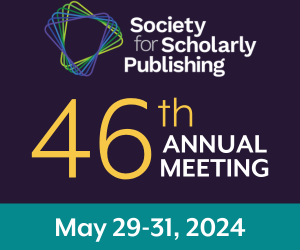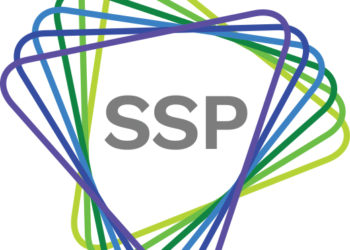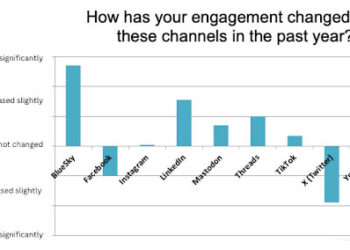In the last 12 months, there has been a resurgence of interest in the business models of scholarly publishing and whether those models best serve the interests of the scholarly community. We’ve covered this here on the Kitchen, and it’s fair to say that the debate at times has been . . . spirited. Underneath the hyperbole and the rhetoric are some serious issues that deserve to be aired:
- What is the best way of measuring the value of an article and its authors?
- What about the costs (for publishers and users)?
- Where’s the disruption coming from?
- What about the ecosystem?
If you are attending the 2012 Society for Scholarly Publishing Annual Meeting, you can join a panel of experts for a provocative yet substantive and civilized discussion. But we need your help with the questions!
Below, you will find a short form that you can use to submit your question. Please keep it decent and above the belt. A good question gives plenty for the panel and the audience to chew on. We have about 90 minutes, so hopefully we’ll be able to get through a broad spectrum of debating points on the value of publishing organisations as part of the scholarly ecosystem and hopefully some of broader points about an industry in flux from the impact of the digital age.
Our Panellists are:
David Crotty, Senior Editor Oxford University Press
David Crotty is a Senior Editor with Oxford University Press’ journal publishing program. He currently oversees a suite of society-owned medical and life sciences journals. David has previously served as an Executive Editor with Cold Spring Harbor Laboratory Press, creating, acquiring, and editing new science books, creating and running new journals, and managing the Press’ online content. David received his PhD in Genetics from Columbia University and did postdoctoral research at Caltech before moving from the bench to a science publishing house. As one of the Society for Scholarly Publishing’s “chefs” at The Scholarly Kitchen blog, David regularly writes about the intersection of technology and publishing.
Jason Priem, University of North Carolina – Chapel Hill
Jason Priem is a PhD student in information science at the University of North Carolina-Chapel Hill. His work focuses on the revolutionary impact of the Web in scholarly communication. He’s interested alternative publishing models, new forms of peer review, and alternative metrics, or “altmetrics,” of scholarly impact based on social media. Jason’s a co-PI of total-impact, an open-source online tool that gathers Web-based evidence of impact for diverse scholarly products.
Thomas Reller, Elsevier
Tom Reller is Vice President and Head of Global Corporate Relations at Elsevier. As Elsevier’s primary media spokesman, Tom is responsible for the company’s relationships with media, analysts and other publishing and health-related communities. Tom also collaborates with many organizations to promote Elsevier’s contributions to Health and Science. These include partnerships developed through the Elsevier Foundation, where he’s responsible for running programs benefiting the global nurse faculty profession. He holds an MA in Legislative Affairs from George Washington University and a BA in Government and Politics from the University of Maryland.
Discussion
5 Thoughts on "Publishers — What Are They Good For?"
Why are you restricting this inquiry to just journals? The answer to the main question is quite different for books than for journals, and it might be worth exploring why and what the differences are.
We haven’t. Sorry if that’s the impression. It’s scholarly publishing in general with a broadening in places to wider publishing issues if the debate goes in those particular directions. Get your questions in!
One can’t avoid that impression since the first subquestion refers to the “value of an article.”


